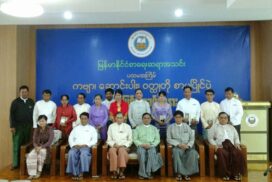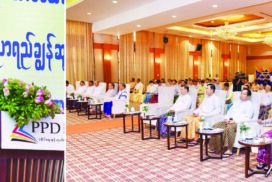
The Sarpay Beikman Manuscript Award presentation ceremony was successfully held at the hall of Printing and Publishing Department on Theinbyu Road on 1 April this year. The ceremony of the National Literary Award was held last year. Due to the period to contain the spread of the COVID-19 Pandemic, the Sarpay Beikman Manuscript Award presentation ceremony was postponed to this year.
The ceremony made me pine for my childhood memories. Although I was born in 1948 when Myanmar regained her independence, my childhood days saw insurgency which was at its peak. Most of the townspeople were panicky clashes, and we had to take refuge in the hiding places or bolt-holes.
As I pursued an education at a monastic primary school, I had no books on knowledge to read except school textbooks. The town we lived in had neither reading rooms nor public libraries. Objectively, people found themselves in the dark age. To make matters worse, there were so many illiterates in our community.
However, we could see a silver lining in the dark cloud. It was nothing but a book I got from the bookshelf of the monastery. The title of the book was ‘ကလေးများအဖို့ ပုံဝတ္ထုများ’ (Tales for Children). On the cover page, I saw a logo with its motto. The logo was an opening book over, which was gleaming light. One side of the book was dark, and its opposite page was white. And a pen was penetrating through the book. The motto was ‘အမှောင်ခွင်း၍ အလင်းဆောင်အံ့’ (Light, where darkness was.). Under the logo, I could read the name of the publishing house ‘မြန်မာနိုင်ငံ ဘာသာပြန်စာပေအသင်း’ (Burma Translation Society). Being a child of tender years, I could not understand what it meant.
The book, indeed, opened my eyes. In those days, almost everyone in my surroundings was illiterate. When I got such books, I read them. Gradually, they came to learn how to read and write. Thus, they could read the books by themselves. In this way, I understood that the motto ‘Light, where darkness was’ brought them from the darkness to the light.
Since then, I have been quite familiar with the name ‘Burma Translation Society’ (BTS), popularly known as ‘စာပေဗိမာန်’ (Sarpay Beikman) today.
As a matter of fact, Sarpay Beikman has a long history. It was the result of the historic conference held on 7 June 1947 at the building of Sorrento Villa, which was situated at 361, Pyay Road in Yangon. The conference gave birth to a Two-year Plan on Economic Development to be implemented when Myanmar regained her independence. The plan was widely known as the “Sorrento Villa Plan”.
The Sorrento Villa Plan was laid down to bring about not only economic development but also literary development. “A translation department should be established to translate useful books and have them published in the interest of the people”, said Bogyoke Aung San in his speech. In order to implement the speech, the Burma Translation Society came into being on 26 August 1947.
Among the 14-point objectives of the BTS, the main aims and objects regarding the literary development were:-
(1) To undertake the translation into Burmese of any publication in English or other foreign languages which is likely to be conducive to the intellectual and cultural development of the indigenous races of Burma;
(2) To undertake or encourage the translation into any foreign language of any of the standard works in the Burmese language or any of the languages of Burma;
(3) To institute or encourage research in Burmese literature and the fine arts with a view to bringing about an improvement in mass education and thereby raising the standard of literacy in Burma;
(4) To produce, publish, distribute or offer for sale of books, pamphlets, periodicals or other reading materials in Burmese or any other language, whether original works, compilations, translations or adaptations and with that end in view to acquire, engage, and/or maintain plants, equipment, production and manufacture of books, pamphlets, periodicals or other reading materials, including illustrations and works of arts.
With these noble aims and objects, the BTS was established and transferred to a house on the campus of Rangoon (Yangon) University in November 1947. Again in 1948, it was transferred to the Sorrento Villa at 361, Prome Road (Now Pyay Road), Yangon. At the same time, the name of Burma Translation, Society was changed into ‘Sarpay Beikman (the name in English, ‘Palace of Literature’ was used at the outset.)
The idea for the motto came from U Ba Ko (Film Academy winner movie star Bo Ba Ko), who had worked for Sarpay Beikman during the post-independence period. The motto ‘အမှောင်ခွင်း၍ အလင်းဆောင်အံ့’ was created by Sayagyi Min Thu Wun. And the motto was translated into English as ‘Light, where darkness was’ by Sayagyi U Khin Zaw (K). The logo was depicted by Artist Alinga-Kyaw-zwa Sayagyi U Ngwe Gaing.
From that year onward, Sarpay Beikman produced three literary series- ‘လူထုအလင်းစာစဉ်’ (Mass Light Book Series), ‘လူထုအိတ်ဆောင်စာစဉ်’ (Mass Light Book Series), and ‘လူထုတက္ကသိုလ်စာစဉ်’ (Mass University Book Series). To enable the reading public to gain knowledge on international affairs, including the world culture, the Mass Light Book Series published translation materials. The Mass Pocket Series produced books on the current affairs of both Myanmar and the world. The Mass University Book Series published the reading materials for those who possessed the basic education standard.
The completion of the Myanmar Encyclopaedia (from Volume 1 to 15), begun in 1949, was a milestone in Myanmar’s progress towards making world knowledge available to all. As a continuation of the encyclopaedia, Myanmar Yearbook has been brought out since 1978. Since 5 March 1956, the Sarpay Beikman Public Library has been open to all, providing services to readers including researchers, compilers, scholars and so on. All in all, the Sarpay Beikman has five divisions — Myanmar Year-Book, Thuta Padetha monthly magazine, People’s Handbook Series, Shwe Thway Children’s Journal and Translation division which are performing their diverse activities.
In carrying out the literary development activities in addition to its normal duties, the Sarpay Beikman annually conducts the literary award presentation ceremonies. To implement its aims and objects, the literary award presentation ceremonies have been held since 1948.
The literary award started with the name of ‘စာပေဗိမာန်ကာလပေါ် ဝတ္ထုဆု’ (Sarpay Beikman Contemporary Novel Award) in 1948. Later, the name was changed into ‘စာပေဗိမာန်ဆု’ (Sarpay Beikman Award), and it lasted up to 1961. The first and foremost winning work was a novel titled ‘Moe Auk Myay Byin’ written by novelist ‘Min Aung’. The awardee received one thousand kyats as the cash prize.
In addition to the category of novel, another six genres–belles-lettres and translation in 1950; general knowledge in 1953; collection of short stories, drama, and collection of poems in 1957 — totally seven in number were increased.
In 1969, the Sarpay Beikman Manuscript Award came into being when those who were not able to publish their manuscripts in book form for various reasons were invited to compete for awards. Unlike the National Literary Award, first, second and third prizes were set apart for the ten genres (except the translation genre for which only the first prize has been designated).
Today, the Sarpay Beikman Manuscript Award includes 14 genres — novel, collection of short stories, collection of poems, belles-lettres, Myanmar culture and arts, children’s literature, youth’s literature, political affairs, drama, general knowledge (arts), general knowledge (pure science and applied science), translation (non-fiction), translation (fiction), and English language.
At the outset, the awardees earned K500, K300, K200 for first, second and third prizes. However, today’s winners are honoured with K1,000,000, K700,000, and 500,000 for first, second and third, respectively.
As long as the logo and the motto ‘Light, where darkness existed, the Sarpay Beikman will give birth to so many promising young writers of the future.
Welcome to ‘Sarpay Beikman Manuscript Award!
Reference:-The rules of the Burma Translation Society, 1947.











